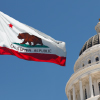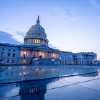A Supreme Split on Religion-Based Charter Schools

May 2025
Number 21
On May 22, 2025, in a 4-4 split decision, the United States Supreme Court upheld an Oklahoma Supreme Court decision denying approval of a religion-based charter school on the grounds that approval of the charter would violate the Establishment Clause of the United States Constitution.
Background
The Oklahoma Statewide Virtual Charter School Board (the Board) is a statutorily created public entity with authority to authorize and sponsor Oklahoma statewide virtual charter schools. Charter schools approved by the Board are considered public schools and, like in California, receive public funding based on student enrollment. The St. Isidore of Seville Catholic Virtual School (St. Isidore) initially received Board approval to establish its charter school, employ a religious curriculum, and utilize religious considerations in admissions and hiring. The State of Oklahoma then sought to overturn the Board’s authorization and prevent public funds being used to support a religion-based charter school. The Oklahoma Supreme Court agreed that the state partnering with, or using public funds to provide support to, a religion-based charter school would violate the Establishment Clause of the United States Constitution. St. Isidore appealed to the U.S. Supreme Court.
The Oklahoma charter school case highlights the growing tension between the Free Exercise Clause and the Establishment Clause in the United States Constitution. The Free Exercise Clause safeguards an individual’s right to freely exercise their religion, while the Establishment Clause prohibits government establishment or sanctioning of a religion or sect, both of which were the focus in oral arguments presented to the Court.
A key question before the Court was whether a charter school constitutes a “state actor.” If yes, the Establishment Clause presumably prevents government-funded and authorized religious schools. If no, and charter schools are private schools accessing a government-run charter school program, then preventing an organization from accessing the program due to the organization’s religious affiliation could arguably violate the Free Exercise Clause.
While many hoped the high court would ultimately decide whether taxpayer dollars may be directed to fund and authorize religion-based charter schools, the split decision leaves this question unanswered. The Oklahoma Supreme Court’s decision to block the Board’s authorization of St. Isidore’s charter remains in place.
Notably, the even 4-4 split was only possible because only eight of the nine justices weighed in, due to Justice Amy Coney Barrett having recused herself from the case.
Implications for California Charter Schools
In California, over 1,200 charter schools educate approximately 11.7 percent of eligible public school students. See Charter Schools in California - CalEdFacts (CA Dept of Education).
California charter schools are state-funded public schools, and religion-based charter schools are not permitted. California law continues to prevent an existing private school from being converted into a charter school. Additionally, California charter schools must be nonsectarian in their programs, admission policies, employment practices, and all other operations. California courts have consistently held that charter school officials are “public officials.” Since the Supreme Court was divided and this ruling does not create a precedent, this issue may return to the Court in the future, potentially impacting California charter schools.
Takeaways
This split Supreme Court decision upholds Oklahoma’s Supreme Court ruling that public funds cannot be used to support religion-based schools. However, the Court will likely revisit these questions of religious interaction with state-funded public education in the future. Lozano Smith will continue to provide relevant legal updates.
If you have any questions regarding your particular agency’s actions in the context of the Free Exercise Clause and/or the Establishment Clause, or other constitutional questions common to governmental entities, please contact the authors of this Client News Brief or an attorney at one of our eight offices located statewide. You can also subscribe to our podcast, follow us on Facebook, X (formerly Twitter) and LinkedIn or download our mobile app.
Number 21
On May 22, 2025, in a 4-4 split decision, the United States Supreme Court upheld an Oklahoma Supreme Court decision denying approval of a religion-based charter school on the grounds that approval of the charter would violate the Establishment Clause of the United States Constitution.
Background
The Oklahoma Statewide Virtual Charter School Board (the Board) is a statutorily created public entity with authority to authorize and sponsor Oklahoma statewide virtual charter schools. Charter schools approved by the Board are considered public schools and, like in California, receive public funding based on student enrollment. The St. Isidore of Seville Catholic Virtual School (St. Isidore) initially received Board approval to establish its charter school, employ a religious curriculum, and utilize religious considerations in admissions and hiring. The State of Oklahoma then sought to overturn the Board’s authorization and prevent public funds being used to support a religion-based charter school. The Oklahoma Supreme Court agreed that the state partnering with, or using public funds to provide support to, a religion-based charter school would violate the Establishment Clause of the United States Constitution. St. Isidore appealed to the U.S. Supreme Court.
The Oklahoma charter school case highlights the growing tension between the Free Exercise Clause and the Establishment Clause in the United States Constitution. The Free Exercise Clause safeguards an individual’s right to freely exercise their religion, while the Establishment Clause prohibits government establishment or sanctioning of a religion or sect, both of which were the focus in oral arguments presented to the Court.
A key question before the Court was whether a charter school constitutes a “state actor.” If yes, the Establishment Clause presumably prevents government-funded and authorized religious schools. If no, and charter schools are private schools accessing a government-run charter school program, then preventing an organization from accessing the program due to the organization’s religious affiliation could arguably violate the Free Exercise Clause.
While many hoped the high court would ultimately decide whether taxpayer dollars may be directed to fund and authorize religion-based charter schools, the split decision leaves this question unanswered. The Oklahoma Supreme Court’s decision to block the Board’s authorization of St. Isidore’s charter remains in place.
Notably, the even 4-4 split was only possible because only eight of the nine justices weighed in, due to Justice Amy Coney Barrett having recused herself from the case.
Implications for California Charter Schools
In California, over 1,200 charter schools educate approximately 11.7 percent of eligible public school students. See Charter Schools in California - CalEdFacts (CA Dept of Education).
California charter schools are state-funded public schools, and religion-based charter schools are not permitted. California law continues to prevent an existing private school from being converted into a charter school. Additionally, California charter schools must be nonsectarian in their programs, admission policies, employment practices, and all other operations. California courts have consistently held that charter school officials are “public officials.” Since the Supreme Court was divided and this ruling does not create a precedent, this issue may return to the Court in the future, potentially impacting California charter schools.
Takeaways
This split Supreme Court decision upholds Oklahoma’s Supreme Court ruling that public funds cannot be used to support religion-based schools. However, the Court will likely revisit these questions of religious interaction with state-funded public education in the future. Lozano Smith will continue to provide relevant legal updates.
If you have any questions regarding your particular agency’s actions in the context of the Free Exercise Clause and/or the Establishment Clause, or other constitutional questions common to governmental entities, please contact the authors of this Client News Brief or an attorney at one of our eight offices located statewide. You can also subscribe to our podcast, follow us on Facebook, X (formerly Twitter) and LinkedIn or download our mobile app.
Disclaimer: As the information contained herein is necessarily general, its application to a particular set of facts and circumstances may vary. For this reason, this News Brief does not constitute legal advice. We recommend that you consult with your counsel prior to acting on the information contained herein.








